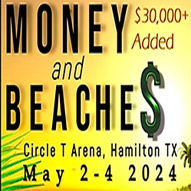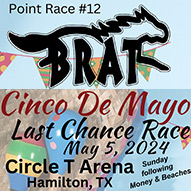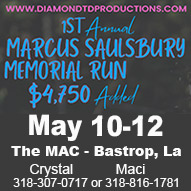Where are you from? I have always called New Mexico home, growing up on the Race Tracks and on my family’s farm in Clovis, NM where my family raises race horses and have a cattle operation. My parents Robert and Del Rae Driggers have been raising and training race horses since before I was born so we went from track to track until I started high school and my parents decided that I needed to not be changing schools so much. My mother and I settled in Clovis, NM, on a farm where we had always kept our mares and colts, taking over that portion of the operation while my dad continued to train until he retired 1996 and joined my mom, well after I graduated from college and got married.
When did you start barrel racing and who has influenced it? My mom, Del Rae Driggers, started me running barrels younger than I can really remember on a pigeon-toed paint horse, creatively named “Paint”, that couldn’t run fast enough to get out of the barn if it was on fire! A pony horse in the morning and on race days, he would give ‘em heck occasionally bucking but when it was the kids turn he was a definite diamond in the rough. We would go to the barrel races, playdays and junior rodeos and he was truly a multi-task animal, game for anything and everything we threw at him…we would put a flat saddle on him to match race him or pretend that he was a hunter jumper, five and six of us would get on him bareback and see if we could all stay on going up the hill in Ruidoso and inevitably several of us would slide right off the back and he would patiently do it over and over again.
My mother knowing my desire to be a “Barrel Racer” did not have much money to spend on a barrel horse so when I outgrew ‘Ol Paint, at about the age of seven, she had Jewel Baize of El Paso, TX train a gray 4-year-old horse for me and although he was a nice horse we soon discovered that a baby on a baby just didn’t work! So we sold him and my mom scrounged up some money and we traveled to Farmington, NM to look at a horse that my sister swore by…he was a big sorrel flaxen mane Shoemaker gelding and sure enough he fit me like a glove. However the sellers decided after I rode him that maybe they just weren’t asking enough money so they jumped up the price. My mom, disgusted by their tactics and having already scrapped the bottom of the barrel, wasn’t going to let him go depending on him passing a vet check. So away we went to the local vet, unload him and he set back getting away from us and went running downtown Farmington for several hours – he didn’t pass the vet check but she bought him anyways. For the next eight years my mother tormented me by hauling me to every horse show within 200 miles…but I must say that looking back on it she was in the right, teaching me versatility in my riding and thought process. That horse taught me a lot about horses and being a competitor, we worked all of the events in the horse show ring, earning his ROM, and in the rodeo arena winning more than our share titles.
While growing up my parents, Robert and Del Rae Driggers, made sure that I got on a variety of horses or should I say culled or retired race horses as a type of continuing education and by the time I was fifteen I was breaking and training my own barrel horses. The economics was another lesson that I learned at young age, after those first three horses I was on my own financially. My parents raise and train race horses but I have always had to buy either from them or from others while my parents contributed to my obsession by helping me out with feed and emotional support, not to mention the occasional loan.
My mother has always been the driving force behind my barrel racing and any success that I have had in the sport, she is very knowledgeable about training both race horses and barrel horses, pedigrees, and picking horses, not to mention a self-taught veterinarian. I guess I should also mention that she has been my traveling nanny. I have been extraordinarily lucky to have been born into a family that has horses running through their blood and that are so knowledgeable, not everyone is so fortunate.
I thank my lucky stars to have had all the opportunities that I have had as well as the support of my parents and my husband who kind of walked into this a little blind…but he has been a quick study!
Do you think of yourself as a professional barrel racer? No, I participate in this sport out of desire, passion and sometimes I think a lack of intelligence.
If your not a professional barrel racer what do you do for a living? My biggest job, and the one I am most proud of, is being “mom” to my four-year-old son Bobby. My husband, Mark Milner, and I have a cow-calf operation. I am the co-owner/publisher of Cowboy Times, a rodeo publication that covers Texas, New Mexico, Oklahoma, Kansas, Colorado and beyond, with my mother. I also compliment my income by training and selling a few barrel horses each year.
What are some of the events that you have won (or races that stand out in your mind)? At the 2000 TCRA Rodeo in Nazareth, Texas I won the barrel race by 6 tenths. This is a small rodeo in a HUGE arena and is touted as “Little Cheyenne” it is probably the only amateur rodeo that also had steer roping in this part of the world. My husband, Mark, and some other guys would always drive from a pro rodeo in Kansas to rope and that year he was just barely edged out of winning the steer roping to make it an even sweeter deal. Sadly they quit having it in 2002, it was a lot of fun and for some reason people always wanted to win that rodeo. Also later in 2000 I got aggravated at that same horse and decided that I would out smart him so I hauled him down to the D & G in Abilene, Texas and ran him to the left out of the clear blue… want to talk about a wild ride! He ended up winning the 4-D buckle and almost $300.00, I learned that I wasn’t as smart as I thought I was, called it good and went home before someone got hurt (mainly me).
Over the years have you noticed any changes in barrel racing? The 4D has been a big boost to the Barrel Racing Industry. In the past those horses that just didn’t quite cut the mustard as a top rodeo horse or “open” horse didn’t have a place unless they were older and/or completely kid broke.
Several years ago when the 3 and 4D’s first started I had a Three Oh’s mare that I had trained, she had an exceptional disposition and an incredible personality but just couldn’t clock up with the big dogs. Every time you took her into the arena she ran her heart out and didn’t make a single mistake; walking out of the arena with her chest out and her head high thinking she had just won the 10th round at the NFR for the World Title when actually she was lucky to get a check in the 2D. I sold that mare for $6500 – if it hadn’t of been for the 4D format she wouldn’t have been worth $1500 and that was only if you could have found someone who would have given her the time of day. After years and years of executing that same perfect little run it became science for her and paid off when she won the Indian National Finals. I have a soft spot in my heart for every horse that I have trained and can always find SOME trait that is good and honorable no matter what caliber they are and this system has allowed for these exceptionally nice horses, who would otherwise be unwanted by buyers and therefore forgotten, to have a job and someone to love them.
What are the good and/or bad changes? I don’t like the equal payouts at the 4D’s, I think that a horse that wins the 1D should win more money than the horse that wins the 4D because that horse is more accomplished. If the 1D had bigger purses then the rest of the field then it would encourage riders to continually strive to be and ride better. Although as a note barrel racers should not become plagued about being a 1D rider or winner because it can play havoc on your psyche making you try too hard, among other things.
Do you have any advice for anyone just starting out in barrel racing? Barrel Racing is a complex sport that is changing everyday… be a sponge watch, listen and learn. What I mean by this is that there is a lot to learn and when a barrel racer gets to the point that they think they know everything that there is to know they had might as well hang up their spurs because they are already defeated before they enter any arena, including the arena of life. After training and competing on many horses I have learned one important thing – each horse is an individual and I can learn something from each and every one that I swing my leg over, if I just listen to them carefully. One thing that my mother has always said is, “Whenever you go to – be it a clinic, barrel race or even a team roping if you can come away learning one new thing it has been worth your time and money. This is something that you can’t do this just staying at home, in order to accomplish that you need to get out in the world.”
But in the same breath I must include this advisory…There are a lot of competitors out there that can do things that, let’s face it, others of us don’t have a chance. Some things are just left for the pros in their field of expertise, just like on TV, “Please do not try this at home, this is a professional stunt.” For instance Bennett Barrington Holt is one of the most agile, athletic and gutsy barrel racers that I know. I have seen her literally step half way off of her horse in the middle of a turn to avoid from hitting a barrel and just keep on going to place deep in the 1D.
Attitude is key… once in an interview that I did with Trudy Peek of Kansas she said a few things that have always stuck with me and goes for all barrel racers young – old – newcomer – or veteran, “If you stay in the sport long enough you will be humbled, more than once! I am thankful everyday that I have the opportunity to compete in this sport and thank God for my horse and all of my family that support me in what I love. You know it can be here one day and gone the next…I think all barrel racers should be more appreciative and thankful for each and every run they are able to make and for the horse that makes it possible, you never know how long it will last and there is always tomorrow.”
With that said the final element of a successful barrel racing career to me is the teacher. Be sure to find a great teacher – that teacher does not necessarily mean a human. A good, solid horse can teach you more than any one person could teach you. When choosing a barrel horse look for a horse that is finished and mature in their profession, a novice horse and a novice barrel racer combination will only make for frustration and financial heartache. When trying horses don’t get into a hurry, make sure that everything about that horse fits you – their disposition, attitude, gait, turn, stop, etc. Make sure that you are 110% comfortable and confident, if you feel like you have to change one thing about your riding or one thing about the horse move on to the next one, there are millions of barrel horses out there and if you get too excited about buying one you will make a serious blunder.
Do you think barrel racing should be limited to women only? Barrel Racing has evolved into such a big sport with lots of financial gain… the more the merrier. There are many women and men riders that I admire for their talents and drive. With all of the advances that producers are making with added money and incredible events I look forward to seeing even tougher competition in the future. As far as in the sport of WPRA or Open Rodeo I think that the barrel racing event should remain strictly a women’s event.
What was the name of your favorite horse and tell us a little about it. I am not a good person to ask that question to because I can pick something good about every horse I have ever ridden, they have all taught me something and I have admiration for each horse’s individuality and what they have given to me in return for all of my blood, sweat and tears. I think all of these factors have made me the horsewoman that I am today.
But if I had to pick one I would have to say a mare that I had during High School and College, Ya Me Voy, aka “Alley” because she came along at a very trying time and had the most impact on my life. Her nickname had many meanings one being Alley Cat because she was a fighter full of determination to do things that weren’t always nice or Al-Po for what I used to tell I was going to turn her into if she wouldn’t come around and make a nice horse!
My parents had bought and paid for my first three horses and this was the first horse that I had invested every dime I had in and of course I couldn’t afford a real live finished horse so I was looking at anything and everything available. I purchased her from a calf roper, D.R. Lewis, and when I pulled up to his place to look at her she was tied up by the barn and I knew right then and there that I had to have her before I even rode her, it was just one of those things that you feel in your soul. She was 14.3 and weighed 1200 pounds and was full of dynamite.
She had been started on the barrels several years before by a girl that would ride her in a straight line down the road with her head cranked to the right because she wouldn’t turn the first barrel, this was a fact that I learned after I had owned her for over a year???
When I started on her she was doing really well so I decided to enter her in some rodeos and found out quickly why I called her Al-Po. One day she would really make a good run and just smash the competition and then the next day she would run five strides by the first barrel and sometimes even all over the pen and was still likely to place deep, it was unbelievable how this short legged mare could mortally fly. But when the push came to shove and I needed her as an emotional crutch she was there, we had such a strong bond and I think that she kept me going, she was my best friend in every sense of the term. That year she really shined in her performances and rebuilt my confidence and self-esteem and eventually the years after being on a continuous roller coaster ride she decided that I wasn’t going to give up so she caved and became consistent. This mare and I won lots of open, college and pro rodeos and due to an accident with another horse in a pasture she was humanely put down right before the College National Finals Rodeo my freshman year, I never really did get over her.





